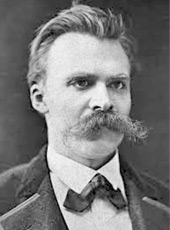A clarion call to rise above mediocrity
 If somebody asks who is the most profound, enigmatic and
controversial philosopher in Western philosophy, the answer will be
Friedrich Nietzsche (1844-1900). He was one of the most vilified,
venerated and thoroughly misunderstood philosophers. At one time his
philosophy was wrongly associated with Nazism. However, his concept of
“Superman” was not somebody such as Adolph Hitler but someone closer to
Aristotle’s “man of virtue.” If somebody asks who is the most profound, enigmatic and
controversial philosopher in Western philosophy, the answer will be
Friedrich Nietzsche (1844-1900). He was one of the most vilified,
venerated and thoroughly misunderstood philosophers. At one time his
philosophy was wrongly associated with Nazism. However, his concept of
“Superman” was not somebody such as Adolph Hitler but someone closer to
Aristotle’s “man of virtue.”
Celebrated psychologist Sigmund Freud paid tribute to him when he
said that Nietzsche “had a more penetrating knowledge of himself than
any other man who ever lived or was ever likely to live.”
Nietzsche was a brilliant son of a Protestant minister. At 24 he was
appointed a professor at the University of Basel. However, he retired
after 10 years due to ill health. Then he devoted much of his time and
energy for writing. He soon became a world famous writer. In 1889 he
suffered a nervous breakdown and remained insane until his death in
1900.
The will to power
Nietzsche was a prolific writer on ethics, religion, metaphysics and
epistemology. He became popular for his concept of “the will to power.”
According to him, moral and religious institutions stifled man’s will to
master his own destiny. He dismissed Christianity as a religion with a
“slave morality.” He saw the resentment of the weak towards the strong.
Those who did not have the courage to seek revenge on the stronger
elements in society expected God to wreak vengeance in the other world.
|

Friedrich Nietzsche: “Faith”
means not wanting to know. |
His explosive and revolutionary ideas offended established religions
and their followers. However, even his detractors conceded that
Nietzsche was a writer with a lucid and poetic style. He considered
himself as a “cultural prophet.” In his The Will to Power he said, “This
future speaks even now in a hundred signs, this destiny announces itself
everywhere; for this music of the future all ears are cocked even now.
For some time now, our whole European culture has been moving us towards
a catastrophe, with a tortured tension that is growing from decade to
decade: restlessly, violently, headlong, like a river that wants to
reach the end that no longer reflects, that is afraid to reflect.”
Decadent society
Nietzsche was one of the first philosophers who noticed the symptoms
of a decadent society in the 19th and 20th century nation states. The
problem with Nietzsche, however, was that he was not simple or clear in
some of his assertions such as “God is dead.”
What is more, he used biting satire, irony, hyperbole and deliberate
contradictions to provoke the establishment and the reader. As a result,
contemporary philosophers and critics found it difficult to identify him
as a philosopher. After two centuries, however, he has emerged as a
literary, psychological and philosophical force to be reckoned with.
Despite his academic brilliance he remained an outsider. At one stage
he experimented with heavy drinking, singing and romantic pursuits. But
he soon realised that such activities were futile. A turning point in
his life came when he met the celebrated philosopher Arthur Schopenhauer
who advocated pessimism. According to Schopenhauer, life is
disappointing. The only way to happiness was to detach yourself from
possessions. By the way, his views were similar to what the Buddha
preached to his followers.
Nietzsche responded positively to Schopenhauer’s philosophy. At one
stage he felt that the great philosopher was addressing him personally.
Nietzsche absorbed his philosophy of renunciation, denial and
resignation and came to the conclusion that life was not the result of a
divine plan. Life was the expression of will. He insisted that life is
governed by the will to power. It was a clear deviation from
Schopenhauer’s philosophy which said the ultimate will is the will to
live.
Doctorate
Nietzsche goes down in history as one of the few people who became
professors without having a doctorate. After appointing him as a
professor the university conferred a doctorate on him without any
examination or dissertation. Nietzsche tried hard to follow the academic
line but the students found him to be an ineffective professor. The
students gradually distanced themselves from him.
Due to ill health and unpopularity among his students, Nietzsche
resigned from the university in 1879 to pursue a path of his own. He
referred to himself as an iconoclast. In fact he did philosophy with a
hammer knocking down great idols to see which were hollow.
In the 1880s he made friends with Lou Salome, a Jewish intellectual.
Their companionship flourished. She became his pupil and lover. when she
left him to marry someone else, he was devastated. Heartbroken he
retreated to the Swiss Alps where he wrote his masterpiece Thus Spake
Zarathustra. It was a clarion call to everybody to rise above decadence
and mediocrity. |

